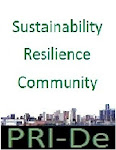A million thoughts are racing through my head as I prepare for my upcoming trip to Detroit to teach a PDC next month. I’m hoping to develop relationships with those leading the urban agriculture movement in what many call "America’s first post-industrial city". This undertaking is hugely significant for the global permaculture movement, in general – and America, in particular.
Well over 80% of Detroit’s population is African American – the demographic most severely impacted by the economic disruptions seen most recently. With the collapse of the automotive industry, the city’s unemployment rate is officially 30% – although many say real unemployment is easily in the 50% range. The burgeoning urban agriculture movement that has emerged in its wake has been a revelation. However, it hasn’t been without its problems.
I had an opportunity to speak with a local leader actively addressing the myriad issues related to food security there. He’s an African American man named Malik Yakini who heads an organization called the Detroit Black Community Food Security Network. Many of those reading this may bristle at the organization’s title – the ‘Black’ part, anyway. As if that holds any special significance or deserves mentioning in the discussion about food security or urban agriculture.
But to be very honest, it has everything to do with those issues. Fresh, high quality food is extremely difficult to come by in many American urban centers – especially in poor communities of color. In blunt terms, the businesses that deal in that trade have little desire or interest in operating in these areas. Frankly, their reluctance to do so is no surprise. Concerns about public safety & profitability are legitimate in many cases. However, that’s merely an indication and symptomatic of a much deeper, pernicious, and hard-to-solve problem.
Mr. Yakini participated in a panel discussion about urban agriculture that took place at The University of Michigan-Dearborn last month. Take a few moments to hear what he has to say. The issues he raises need to be properly understood and acted upon. Another person on the panel worth looking up is Dr. Oran Hesterman from the Fair Food Network. Both offer critical insights into this increasingly important matter:

No comments:
Post a Comment